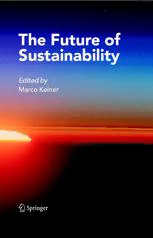
The Future of Sustainability PDF
Preview The Future of Sustainability
The Future of Sustainability Edited by Marco Keiner The Future of Sustainability The Future of Sustainability Edited by Marco Keiner Swiss Federal Institute of Technology, ETH Zürich AC.I.P. Catalogue record for this book is available from the Library of Congress. ISBN-10 1-4020-4734-7 (HB) ISBN-13 978-1-4020-4734-3 (HB) ISBN-10 1-4020-4908-0 (e-book) ISBN-13 978-1-4020-4734-3 (e-book) Published by Springer, P.O. Box 17, 3300 AADordrecht, The Netherlands. www.springer.com Printed on acid-free paper Cover Photo with Courtesy from NASA, Source: NASA Head quarters, Photo Department, Washington DC, sts 111-321-024.jpg All Rights Reserved © 2006 Springer No part of this work may be reproduced, stored in a retrieval system, or transmitted in any form or by any means, electronic, mechanical, photocopying, microfilming, recording or otherwise, without written permission from the Publisher, with the exception of any material supplied specifically for the purpose of being entered and executed on a computer system, for exclusive use by the purchaser of the work. Printed in the Netherlands This book is dedicated to Hans-Georg Raidl Prof. Dr.Eckhardt Jungfer Dr. Hans Kissling Prof. Dr. Klaus Giessner and Prof. Dr.WillyA. Schmid They all knowwhy. Contents Acknowledgements ix Marco Keiner Rethinking Sustainability—Editor’s Introduction 1 Sustainability—Quo Vadis? Albert A. Bartlett Reflections on Sustainability, Population Growth, and the Environment—2006 17 Herman E. Daly Sustainable Development—Definitions, Principles, Policies 39 Peter Marcuse Sustainability is Not Enough 55 Challenges to Sustainable Development Marios Camhis Sustainable Development and Urbanization 69 Helena Norberg-Hodge Sustainable Economies—Local or Global? 99 Klaus M. Leisinger Business and Human Rights 117 New approaches Mikhail Gorbachev A New Glasnost for Global Sustainability 153 vii viii Contents Dennis L. Meadows Tools for the Transition to Sustainability 161 ErnstUlrich von Weizsäcker ‘Factor Four’ and Sustainable Development in the Age of Globalization 179 Mathis Wackernagel Ecological Footprint Accounting—Comparing Earth’s Biological Capacity with an Economy’s Resource Demand 193 Marco Keiner Advancing Sustainable Development and its Implementation Through Spatial Planning 211 Alan AtKisson Sustainability is Dead—Long Live Sustainability 231 About the Authors 245 Index 255 Acknowledgements The editor would like to thank – Alexander Likhotal, President, Sabine Arrobbio and Marianne Berner from Green Cross International, Geneva, Switzerland, for permission to use substantial parts of the article “A New Glasnost for the Planet”, first published in The Opti- mist Magazine, Issue 1, April 2004 (www.optimistmag.org) – David Satterthwaite from the Human Settlements Programme of the International Institute for Environment and Development (IIED), London, U.K. for granting per- mission to reprint the chapter “Sustainability is not enough” by Peter Marcuse, originally published in Environment and Urbanization, Vol. 10, No. 2, Oct 1998, pp. 103–111 – Lynne O’Hara from Chelsea Green Publishing Company, White River Junction, VT, USA, for permission to reprint the chapter “Tools for the Transition to Sus- tainability” from “Limits to Growth: The 30-Year Update”. Copyright © 2004 Dennis Meadows – Alice Essenpreis from Springer Science and Business Media, Heidelberg, for granting permission to reprint the revised chapter “Reflections on Sustainability, Population Growth, and the Environment–2006” by Albert Bartlett, originally published in Population & Environment, Vol. 16, No. 1, September 1994, pp. 5–35 – Rachel Sykes and Rachel Warrington, International Society for Ecology and Culture, Dartington (UK), Markus Breuer and Karin Schmitt from the Novartis Foundation, Basle, for their fruitful collaboration – Martina Koll-Schretzenmayr, Anita Schürch, Andreas Gähwiler, Oswald Roth, and especially Arley Kim from the Institute for Spatial and Landscape Planning at ETH Zurich for editorial help, layout and critical proofreading and – Prof. Dr. Willy A. Schmid, Head of the Institute for Spatial and Landscape Planning at ETH Zurich, for his encouragement and support over the years ix “Ce qui sauve, c’est de faire un pas. Encore un pas. C’est toujours le même pas que l’on recommence …” Antoine de Saint-Exupéry, Terre des Hommes Rethinking Sustainability—Editor’s Introduction MARCO KEINER The Ambiguity of ‘Sustainability’ At the end of the last Millennium, when lofty visions were as ubiquitous as talk of what mankind has accomplished and in what direction it is heading, ‘sustainable development’ or ‘sustainability’ became the theoretical basis and an increasingly important societal norm for human development worldwide. For some, sustainability is “the way to live in harmony with the environment.” (Glasby 2002) The success of both terms—‘sustain- ability’ and ‘sustainable development’—stems from underlying reflections on existential problems of mankind: increasing concern over exploitation of natural resources and economic development at the expense of envi- ronmental quality (cf Ward and Dubos 1972). Today, the objective of sustainable development is acclaimed by almost all international organizations, national governments, and also private enter- prises. This general consensus seems mainly to rest upon the vague sub- stance of the term ‘sustainability’ itself, which leaves much room for interpretation (Voss 1997). For the definition of ‘sustainable develop- ment’ we generally refer to the 1987 Brundtland Report of the World Commission on Environment and Development (WCED 1987): 1 M. Keiner (ed.), The Future of Sustainability, 1–15. © 2006 Springer. Printed in the Netherlands.
